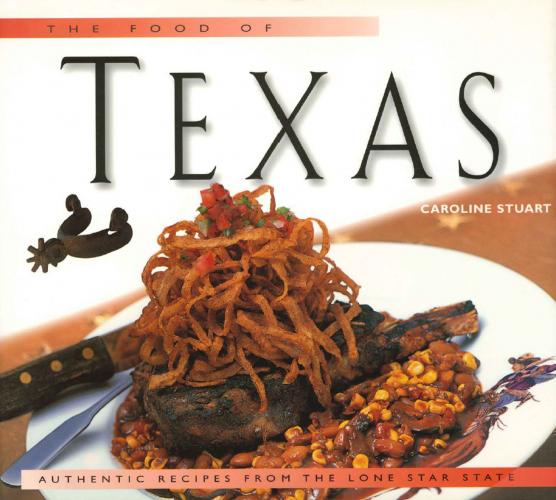Published by
Periplus Editions (HK) Ltd.
with editorial offices at
364 Innovation Drive, North Clarendon,
VT 05759 U.S.A. and
61 Tai Seng Avenue, #02-12
Singapore 534167
Copyright © 2000
Periplus Editions (HK) Ltd.
ALL RIGHTS RESERVED
ISBN: 978-1-4629-0133-3 (ebook)
Library of Congress Catalog Number: 99-050251
Credits:
All photography by Jacob Termansen. Additional photographs by Will van Overbeek (pages 2, 4, 8-23, 26-28).
Distributors
North America, Latin America, Europe, and the Middle East
Tuttle Publishing
Distrbution Center
Airport Industrial Park
364 Innovation Drive
North Clarendon, VT 05759-9436
Tel: (802) 773-8930
Tel: (800) 526-2778
Japan
Tuttle Publishing
Yaekari Building 3rd Floor, 5-4-12
Osaki Shinagawa-ku,
Tokyo 141-0032
Tel: (03) 5437-0171
Fax: (03) 5437-0755
Asia-Pacific
Berkeley Books Pte. Ltd
61 Tai Seng Avenue, #02-12
Singapore 534167 Tel: (65) 280-1330
Fax: (65) 280-6290
First Edition
3 5 79 10 8 64 2
06 05 04 03 02 01 00
PRINTED IN SINGAPORE
THE FOOD OF
TEXAS
Authentic Recipes from the Lone Star State
by Caroline Stuart
With additional essays by Dotty Griffith
Featuring recipes from the following Texas restaurants:
| Reata Restaurant | DeVille Restaurant |
| Star Canyon | Ruggles Grill |
| Laurels | Boulevard Bistrot |
| Cafe Annie | Las Canarias |
| Américas | Pappas Brothers Steakhouse |
| The Mansion on Turtle Creek |
Photography by Jacob Termansen and Will van Overbeek
Styling by Christina Ong
Contents
PART ONE: FOOD IN TEXAS Introduction 5 Culinary History of Texas 6 The Biggest and the Best of Texas 11 The Mexican Connection 15 Where's the Beef? 19 Around the State 22
PART TWO: COOKING IN TEXAS The Texas Kitchen 29 Texas Ingredients 30
PART THREE: THE RECIPES Football Snacks 35 Snacks and Appetizers 38 Soups; Salads, and Sandwiches 48 Seafood 66 Poultry 72 Meat 88 Desserts 114 Drinks 126
APPENDICES Additional Recipes 127 Acknowledgments 140 Sources 141 Shops & Artists 141 Index 143
Patron John Boutin prepares to devour a crispy-fried tower of onion rings at Restaurant Biga in San Antonio. Hell wash it down with a bottle of Shiner Bock beer, brewed locally in Shiner, Texas.
Part One: Food in Texas
From the prairies to the Gulf Coast, the Lone Star State has it all
by Caroline Stuart
When we think of Texas, it is inevitable—and expected—that legend springs to mind. It is, after all, the second-largest state in the U.S. and home to larger-than-life legends Buddy Holly, Lyndon B. Johnson, Scott Joplin, and Gene Autry. From its panhandle on down to the Gulf of Mexico and the Rio Grande, Texas is filled to its ten-gallon brim with cattle drives and chuck wagon meals, ornery longhorn steer, and oil gushers spewing black gold.
Everything here is big, from its prairies, to its ranches, to its oil baron mansions. Make no mistake, the Lone Star State is known for the serious appetites of its loyal Texans. And the history of Texas food is equally impressive. Over hundreds of years, its culinary heart and soul has been shaped by countless inhabitants, each stirring their own ingredients into timeless Lone Star recipes.
Just sample this diversity for yourself. Early Spanish explorers found Native Americans making fry bread, raising vegetables, and flavoring their food with local pecans. Chicken-fried steak, a Texas classic, was an adaptation of German immigrants' beloved Wiener schnitzel. And in San Antonio, Mexican buhuelos are still a Christmas tradition; Each region has a style of food to boast about, resulting in fascinating cross-cultural creations. In fact, it's not unusual for a pot of fiery chili to share a table with crunchy Southern fried chicken, German bacon-laced potato salad, and Mexican nachos. All to be washed down with margaritas or ice-cold beer.
The state's location provides the backdrop for this rich, varied cuisine. The Gulf Coast supports a thriving seafood industry; Texas wineries have existed since 1662 when Franciscan priests discovered local grapes. Strong culinary influences from neighboring Mexico permeate menus throughout the state. Long ties to the colonial South put peach cobbler on the tables of East Texas, while Cajun cooks from Louisiana introduced gumbos. Other immigrant influences arrived from farther afield, providing more intrigue to the mix: Spanish chorizo sausage and fruit-filled Czech pastries.
Eating establishments vary as much as the fare. Barbecue joints remain justly famous for succulent brisket, ribs, and chicken. Urban cowboys crowd upscale
